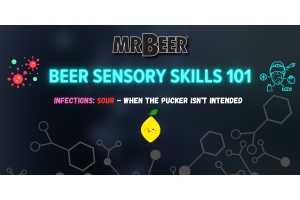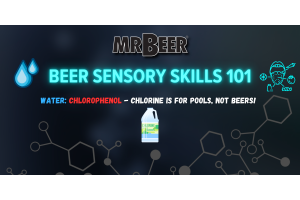Brewing Hard Cider

Hard Cider is one of the fastest growing markets in the beverage industry. Domestic cider production rose by 264% between 2005 and 2012. Industry revenue has grown by the hundreds of millions, and Americans, who were once skeptical of cider, are now drinking it up by the gallons.
How to "Hack" Your Mr. Beer Cider Kit
Our Hard Cider Kit makes crisp, dry cider that is incredibly tasty, but if it's time for a change, there are many ways to modify your cider brew to keep things interesting.
Things you can add to your Mr. Beer Cider Kit/Refill:
- Brown sugar
- Vanilla
- Honey
- Maple syrup
- Fruit
- Spices
- Malt extract (though this is not gluten free). Called a "graf" when brewed as a beer/cider hybrid.
- MORE APPLES!! You can experiment with using different apple juices in place of your water.
Yeast Selection
Yeast can be chosen for the attributes it brings to the finished cider, just as we do for beer. A clean American ale yeast will give the cider a clean apple flavor. A British yeast will add some bready/yeasty notes. A Belgian ale yeast will impart some fruit and bubble-gum like notes to the cider. And a wine yeast can be used to make it very dry and effervescent. You can also do mixed culture fermentations to make sour ciders and brett ciders brewed with brettanomyces. These have been growing in popularity the past few years, as have barrel-aged ciders.
You Can Also Make Quality Cider From Scratch
To make the best hard cider, you need apples with a lot of sugar to encourage fermentation and specific levels of acid and tannins. No single apple variety has all of these attributes so you may need to blend different apples to get the best results. Apple varieties are usually broken down into 3 categories, Sweet, Sharp, and Bitter.
SWEET
These apples have a high sugar content to make your cider sweet, but they'll need partners from the other groups: Golden Delicious Fuji Gala Red Delicious Jonagold
SHARP
Tartness comes with higher acid levels: Gravenstein McIntosh Northern Spy Winesap Liberty
BITTER including BITTER-SWEET and BITTER-SHARP/BITTER-TART
Bitter-sweets are high in the tannins that add complex flavor to ciders, and high in sugar. Bitter-sharp and bitter-tart are two names for the group of apples that are high in tannins, with plenty of acid. Dolgo Crabapple Cortland Newtown Foxwhelp Porter's Perfection A good blending starting point for new cider makers is 50% sweet, 35% sharp, and 15% bitter. You won't typically find all of these apples in many grocery stores, or even your local farmers market. But if you grow your own apples, know someone who does, or you're willing to pay a premium for true cider apples such as the distinctly flavored Kingston Black, Yarlington Mill, and Porters Perfection, then you have a shot at creating a hard cider that is truly unique.In the meantime, baking apples tend to work the best due to their sugar content and acid blend. Experiment and research to find the best apples for your cider. Making apples from scratch requires an apple crusher, a press, and a LOT of labor. It can be a very difficult, but rewarding process. Our concentrates are already made with a blend of NW apples that make a great cider base, but don't let that deter you from experimenting with different juices to supplement our apple concentrate.
Making Sweet Hard Cider
Our cider kits make a dry English-style cider. Unfortunately, the sweeter American style ciders can be more difficult to make due to the yeast wanting to consume all that sugar. Kegging the cider is the best way to make sweet cider. This way, you don't have to rely on the yeast to consume the sugar you are adding for sweetness (called back-sweetening). Instead, you can simply add the desired amount of sugar (you can also use apple juice, honey, etc) and force carbonate the beer with your Co2 tank. Because this is done while cold, the yeast are dormant and will not consume the sugar you added (which can cause bottle bombs). If you decide to bottle this from the keg or store the keg at room temps for aging, you will need to add potassium sorbate to kill the yeast and prevent refermentation.





